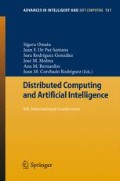Abstract
In qualitative spatial and temporal reasoning we can distinguish between comparing and naming magnitudes. In particular, naming qualitative models allow humans to express spatio-temporal concepts such as “That horse is really fast”. In colloquial terms, naming concepts are called relative. In this paper we present a general framework to solve the representation magnitude and a general algorithm to solve the basic step of inference process of qualitative models based on intervals. The general method is based on the definition of two algorithms: the qualitative sum and the qualitative difference.
Access this chapter
Tax calculation will be finalised at checkout
Purchases are for personal use only
Preview
Unable to display preview. Download preview PDF.
References
Allen, J.: Maintaining knowledge about temporal intervals. Communications of the ACM 26, 832–843 (1983)
Cioaca, E., Linnebank, F., Bredeweg, B., Salles, P.: A qualitative reasoning model of algal bloom in the danube delta biosphere reserve (ddbr). Ecological Informatics 4(5-6), 282–298 (2009)
Clementini, E., Felice, P.D., Hernández, D.: Qualitative representation of positional information. Tech. rep., Technische Universität München (1995)
Clementini, E., Felice, P.D., Hernández, D.: Qualitative representation of positional information. Artificial Intelligence 95(2), 317–356 (1997)
Cohn, A., Hazarika, S.: Qualitative spatial representation and reasoning: An overview. Fundamenta Informaticae 46(1-2), 1–29 (2001)
Escrig, M., Toledo, F.: Qualitative Spatial Reasoning: Theory and Practice. In: Application to Robot Navigation. Frontiers in Artificial Intelligence and Applications, vol. 47, IOS Press (1998)
Escrig, M., Toledo, F.: Qualitative Velocity. In: Escrig, M.T., Toledo, F.J., Golobardes, E. (eds.) CCIA 2002. LNCS (LNAI), vol. 2504, Springer, Heidelberg (2002)
Freksa, C.: Using Orientation Information for Qualitative Spatial Reasoning. In: Frank, A.U., Formentini, U., Campari, I. (eds.) GIS 1992. LNCS, vol. 639, Springer, Heidelberg (1992)
Freksa, C., Zimmermann, K.: On the utilization of spatial structures for cognitively plausible and efficient reasoning. In: SMC, Chicago, USA, pp. 261–266 (1992)
Guerrin, F., Dumas, J.: Knowledge representation and qualitative simulation of salmon redd functioning. part i: qualitative modeling and simulation. Biosystems 59(2), 75–84 (2001)
Hernández, D.: Qualitative Representation of Spatial Knowledge. LNCS, vol. 804. Springer, Heidelberg (1994)
Holzmann, C.: Rule-based reasoning about qualitative spatiotemporal relations. In: 5th MPAC, Newport Beach, California, pp. 49–54 (2007)
Jong, J.: Qualitative reasoning about distances and directions in geographic space. Ph.D. thesis, Dept. of Surveying Engineering, University of Maine (1994)
King, R., Garrett, S., Coghill, G.: On the use of qualitative reasoning to simulate and identify metabolic pathways. Bioinformatics 21(9), 2017–2026 (2005)
Knauff, M., Strube, G., Jola, C., Rauh, R., Schlieder, C.: The psychological validity of qualitative spatial reasoning in one dimension. Spatial Cognition & Computation 4(2), 167–188 (2004)
Levinson, S.: Space in Language and Cognition. In: Explorations in Cognitive Diversity. Cambridge University Press, United Kingdom (2003)
Liu, H.: A fuzzy qualitative framework for connecting robot qualitative and quantitative representations. IEEE Trans. on Fuzzy Systems 16(6), 1522–1530 (2008)
Salles, P., Bredeweg, B.: Modelling population and community dynamics with qualitative reasoning. Ecological Modelling 195(1-2), 114–128 (2006)
van de Weghe, N., Cohn, A., de Tré, G., de Maeyer, P.: A qualitative trajectory calculus as a basis for representing moving objects in geographical information systems. Control and Cybernetics 35(1), 97-119 (2006)
Werthner, H.: Qualitative Reasoning. Modeling and the generation of behaviour. Springer (1994)
Author information
Authors and Affiliations
Corresponding author
Editor information
Editors and Affiliations
Rights and permissions
Copyright information
© 2012 Springer-Verlag Berlin Heidelberg
About this paper
Cite this paper
Martínez-Martín, E., Escrig, M.T., del Pobil, A.P. (2012). A General Framework for Naming Qualitative Models Based on Intervals. In: Omatu, S., De Paz Santana, J., González, S., Molina, J., Bernardos, A., Rodríguez, J. (eds) Distributed Computing and Artificial Intelligence. Advances in Intelligent and Soft Computing, vol 151. Springer, Berlin, Heidelberg. https://doi.org/10.1007/978-3-642-28765-7_82
Download citation
DOI: https://doi.org/10.1007/978-3-642-28765-7_82
Publisher Name: Springer, Berlin, Heidelberg
Print ISBN: 978-3-642-28764-0
Online ISBN: 978-3-642-28765-7
eBook Packages: EngineeringEngineering (R0)

